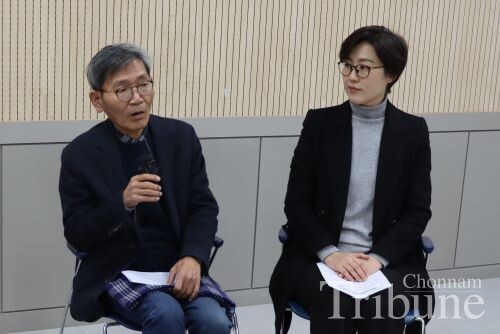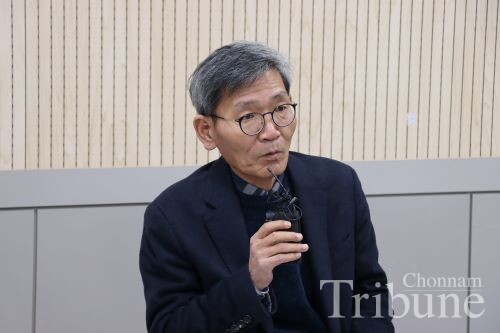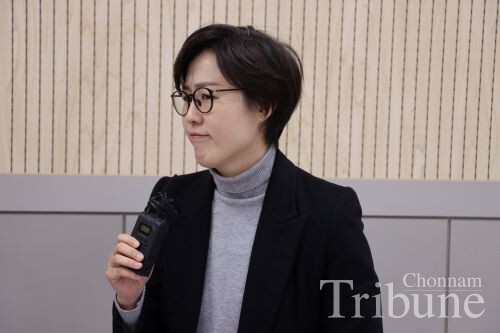An Interview With Journalist Kim Joo-wan and Director Kim Hyun-ji

Commemorating the 70th anniversary of The Chondae Shinmun, the Press and Broadcasting Center of Chonnam National University hosted a media forum with local society, "Meet a Man Who Heals the City: Kim Jang-ha." The event was held at the Cosmos Hall, located in the College of Engineering 4 building, on Jan. 9. The forum consisted of two parts, and in the first part, the documentary movie "A Man Who Heals the City" was played. The second part included a guest visit with Kim Hyun-ji, the director of the documentary movie, and journalist Kim Joo-wan, the writer of the book "If I Gave It, That’s Enough." Before proceeding with the guest visit, the Chonnam Tribune conducted an exclusive interview with Kim Hyun-ji and Kim Joo-wan at the center office located on the second floor of the Student Union 1 building.
Q. How did you learn about Kim Jang-ha? Why did you decide to cover and film a documentary about him?
Kim Joo-wan (KJW): I first heard about Kim Jang-ha in 1991, when he donated the school he had established and managed. Since then, I have always wanted to cover and record something about him someday. I finally got down to it in 2021, when director Kim Hyun-ji suggested creating a documentary.
Kim Hyun-ji (KHJ): I was informed about Kim Jang-ha at a drinking party. I could not believe that there was an amazing person like him, so I decided to write a proposal to create a documentary. Since Kim Jang-ha did not accept interviews, I contacted Kim Joo-wan to produce the film together.

Q. In this present age, provocative and negative coverages are mainly reported. What kind of transition can a good influencing coverage draw to our society?
KJW: The mass media is currently reporting the conflicts between the older generation and the young generation, which is known as generational conflict. But when you look around our surroundings, there are tons of excellent and conceptual young adults and honorable senior citizens. The press is highlighting the most serious matters and detestable images of each generation, which leads to general division. Including Kim Jan-ha, there is a great deal of adults we could honor near us. We should not be deluded by the negative press and should spur on each other with an open and warm view.
KHJ: I understand the properties of the media to follow negative issues, but it has gone too far. I am always agonizing over how to change this problem as well. So, I wanted to show this movie to the growing young generation. The current media emphasizes the reflections of a single 'save one’s own skin’ lifestyle and considers good-natured things as something tacky. I wanted to tell the youth that those are the rather strong and wonderful points of life. People want to gain happiness, but the fastest and easiest way to do so is by helping others together.
Q. The recruitment of an interviewee is important, but drawing the answers out of them is the key point of the process. How did you approach Kim Jang-ha and the people around him as a journalist?
KJW: It is important to research advanced information about the interviewee before meeting them in person. If there is not any research beforehand, the results of the interview can be weak, and the interviewee themselves can feel underrated. Before meeting the people around Kim Jang-ha, I always investigated them through every route and method.

Q. In the last scene of the movie, Kim Jang-ha salutes the camera after officially closing his herbal medicine shop. Do you have a specific reason for setting it as the final ending scene?
KHJ: Kim Jang-ha healed the community for 60 years while running his herbal medicine shop. So, I wanted to show the audience his broad-minded beauty. That scene was not the original last scene timewise, but I wanted to remind the audience of their responsibility (as members of our society) by showing his retirement.
Q. The college press is currently facing diverse problems like budget reduction, a shortage of manpower, and a lack of attention. If you have the opportunity to become a college student reporter again, what kind of content do you want to create, and how will you run the college press?
KJW: The environment of college media has changed since my days. Back then, college newspapers were a symbol of honor and pride. If I were a student reporter these days, I would try to change the channel of newspapers so that exposure to students increases. Since the young generation is exposed to the internet more, I would develop the internet field more than the old-fashioned print newspapers.
By Jeong So-rin, Reporter
Photo by Bae Mun-seong, Editor

